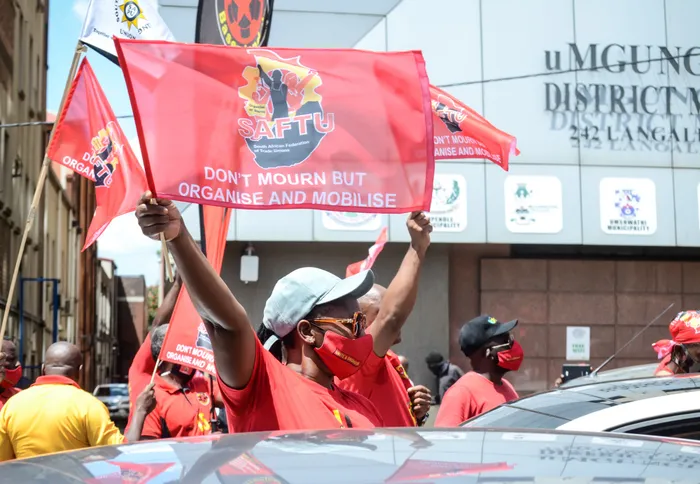SAFTU rallies for workers' rights on International Workers' Day

Workers unite: South African Federation Trade Union's message on International Workers' Day
Image: Motshwari Mofokeng/Independent Newspapers
South African Federation of Trade Unions (SAFTU) marked the International Workers’ Day with a rallying cry for solidarity against government austerity measures, proposed labour law amendments, and the widening inequality gap.
Vavi underscored May Day’s roots, recalling the 1886 Haymarket Massacre in Chicago, where police opened fire on workers demanding an eight-hour workday.
“No right was given freely—every gain was won through mass struggle,” he stated.
“Today, we are in solidarity with workers worldwide who continue to fight for dignity and justice. In South Africa, May Day is more than a commemoration; it’s a call to action.
“It’s a day of battle—a day to renew our fight against capitalist exploitation and racial oppression,” Vavi declared.
Current Challenges Facing Workers
Vavi painted a stark picture of South Africa’s socio-economic landscape, warning of an “onslaught” on workers’ rights.
He condemned austerity policies, corporate greed, and the erosion of hard-won gains. “Our communities are being torn apart by policies prioritizing profits over people,” he said.
Recent protests in Cape Town and across the country, where workers marched against a proposed VAT hike—the union describing it as a “tax on the poor”—sparked this renewed activism.
SAFTU also welcomed a recent court victory by the Economic Freedom Fighters (EFF), which challenged the government’s VAT implementation, exposing authorities’ lawlessness.
Exposing Political Betrayal
Vavi accused the Democratic Alliance (DA), South Africa’s main opposition, of hypocrisy.
While publicly opposing VAT increases, the DA allegedly plotted to weaken public services, sabotaging efforts like the National Health Insurance (NHI), blocking education reforms, and privatising state assets.
“The DA’s game is not to defend the poor but to serve big business; we must reject their treachery and build our power,” Vavi charged.
Vavi painted a stark picture of South Africa’s socio-economic landscape, warning of an “onslaught” on workers’ rights.
He condemned austerity policies, corporate greed, and the erosion of hard-won gains. “Our communities are being torn apart by policies prioritising profits over people,” he said.
Recent protests in Cape Town and across the country, where workers marched against a proposed VAT hike—the union describing it as a “tax on the poor”—sparked this renewed activism.
Exposing Political Betrayal
Vavi accused the Democratic Alliance (DA), South Africa’s main opposition, of hypocrisy.
While publicly opposing VAT increases, the DA allegedly plotted to weaken public services, sabotaging efforts like the National Health Insurance (NHI), blocking education reforms, and privatizing state assets.
“The DA’s game is not to defend the poor but to serve big business; we must reject their treachery and build our power,” Vavi charged.
Threats to Workers’ Rights
SAFTU warned of a broader assault on workers’ rights through proposed amendments to labor laws and the draft Code of Good Practice on Dismissal.
These, they argued, threaten to legitimise arbitrary dismissals, workplace discrimination, and union busting. “These proposals are a declaration of war,” Vavi emphasises.
The union called for mass resistance, urging workers to reject these changes and defend their rights to strike, organise, and resist.
Land and Worker Struggles: The Voice of the Land Party SA
The Land Party SA issued a statement linking worker struggles with land justice, adding depth to the ongoing conversation.
Avela Sithonga, Head of Communications, reflected on worker resistance's historical and ongoing significance, tying it to land struggles and anti-capitalist resistance.
“The Marikana massacre, where 34 mineworkers lost their lives protesting exploitation, remains a stark reminder of the brutal response to worker dissent,” Sithonga said.
“Worker struggles are inherently land struggles.” He called for a united front against systemic land dispossession, emphasising that land restitution is essential for true emancipation.
Tributes were paid to fallen workers worldwide, including those killed during the 2012 Marikana massacre.
Sithonga condemned the government’s use of police to terrorise activists and called on unemployed South Africans to demand job creation.
“We condemn the government’s use of police to intimidate workers and activists,” he stated.
“There are no rights worth fighting for without jobs. We call for abolishing minimum wages below the taxable income and introducing a genuine living wage.”
He emphasised strengthening local manufacturing to boost economic growth and reduce unemployment
“A prosperous economy depends on a government committed to prioritising people’s needs.”
thabo.makwakwa@inl.co.za
IOL Politics
The Roots of the Land Party SA
Sithonga recounted how the Land Party emerged from struggles over land access and racial discrimination in employment.
He stated that the party fought against illegal dismissals and defended landless protesters, notably in Hermanus.
He also highlighted that the party has intervened in construction projects in Stanford, advocating for local employment, and fought exploitation of undocumented workers by some local companies, where migrant workers face low pay and poor conditions.
Much like SAFTU, Sithonga criticised the DA’s policies in Western Cape, which he says encouraged exploitation and contributed to workplace accidents, including last year’s deadly collapse in George.
“We demand that South Africans get priority in leasing public buildings and that racial discrimination in workplaces ends,” he declared.
On the anniversary of their march for local employment, Sithonga called for continued resistance against capitalism.
Related Topics:
